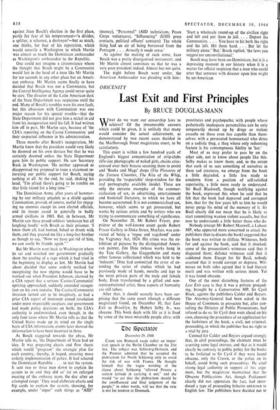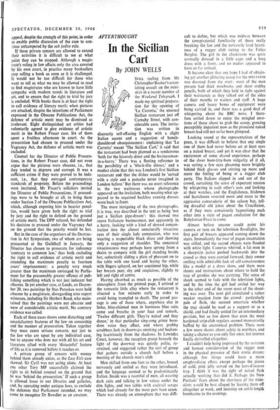Last Exit and First Principles
OBSCENITY
By BRUCE DOUGLAS-MANN
WHAT do we want our censorship laws to achieve2 Of the innumerable answers which could be given, it is unlikely that many would consider the actual achievement, as demonstrated by two recent cases decided in the Marlborough Street magistrates court, to be satisfactory.
This court is within a few hundred yards of England's biggest concentration of strip-clubs (life-size photographs of naked girls, chains criss- crossed over their breasts securing them to posts) and 'Books and Mags' shops (The Pleasures of the Torture Chamber, The Kiss of the Whip, providing the 'respectable' shop-window for the real pornography available inside). These are only the extreme examples of the commer- cialisation of sex, in advertising, entertainment and bookstall literature, to which we have all become accustomed. It is not commercialised sex, however, which seems to get prosecuted, but works by serious artists and by writers who are trying to communicate something of significance.
On November 28, Mr Robert Fraser, pro- prietor of the well-known avant garde Robert Fraser Gallery in Duke Street, Mayfair, was con- victed of being a 'rogue and vagabond' under the Vagrancy Act, 1824. His crime was the ex- hibition of pictures by the distinguished Ameri- can painter, Jim Dine (whose works hang in the Tate Gallery, the Guggenheim and many other famous collections) which was held to be `indecent.' Dine had committed the error of ex- tending the series of studies which he had previously made of hands, mouths and legs to the more private parts of the male and female body. Even transformed by a gifted and non- representational artist, these aspects of humanity are still taboo.
After that, it should scarcely have been sur- prising that the same court (though a different magistrate) found, on December 10, that Last Exit to Brooklyn, by Hubert Selby Jr., was obscene. This book deals with life as it is lived by some of the most miserable people alive; with prostitutes and psychopaths; with people whose pathetically inadequate personalities can be only temporarily shored up by drugs or violent assaults on those even less capable than them- selves; with a persecuted homosexual who dotes on a sadistic thug, a thug whose only redeeming feature is his contemptuous fidelity to 'her.'
Most of us may prefer to pass by on the other side, not to know about people like this. Selby makes us know them; and, to the extent that each of us sees something of ourselves in these sad creatures, we emerge from the book a little degraded, a little less ready to condemn from a position of self-satisfied superiority, a little more ready to understand. Sir Basil Blackwell, though testifying against the book, expressed this when he said that he felt that the book had depraved and corrupted him, that for the few years left to him he would never purge his mind of the memory of it. Sir Basil clearly did not mean that he is likely to stars committing wanton violent assaults, but that now he understands a little better those who do.
Nobody (except Mr Robert Maxwell, a Labour MP, who appeared more concerned to attack the publishers than to discuss the book) suggested that the book was written to titillate. Witnesses, both for and against the book, said that it shocked; some of the prosecution's witnesses said that it disgusted them; defence witnesses said that it saddened them. Except for Sir Basil, nobody asserted that it would corrupt or deprave. Wit- nesses on both sides agreed that it had literary merit and was written with serious intent. Yet it was found obscene.
One of the most disturbing features of the Last Exit case is that it was a private, proceed- ing, brought by a Conservative MP, Sir Cyril Black, against the publishers Calder and Boyars. The Attorney-General had been asked in the House of Commons to prosecute but, after con- sulting the Director of Public Prosecutions, had refused to do so. Sir Cyril then went ahead on his own, choosing the procedure of an application for the forfeiture of the book, a civil, not criminal, proceeding, in which the publisher has no right to a trial by jury.
Counsel for Calder and Boyars argued strongly that, in civil proceedings, the claimant must be asserting some legal interest, and that as it would clearly be contrary to public policy for the books to be forfeited to Sir Cyril if they were found obscene, only the Crown, or the police on its behalf, could bring such proceedings. He cited strong legal authority in support of this argu- ment, but the magistrate maintained that the Obscene Publications Act, though Parliament clearly did not appreciate the fact, had intro- duced a type of proceeding hitherto unknown to English law. The publishers have decided not to
appeal, despite the strength of this point, in order to enable public discussion of the case to con- tinue unhampered by the sub judice rule.
If these private censors are allowed to extend their activities it is difficult to see at what point they can be stopped. Although a magis- trate's ruling in law affects only the area covered by his own court, in practice many booksellers stop selling a book as soon as it is challenged.
It would not be too difficult for those who want to tell us what we may be allowed to read to find magistrates who are known to have little sympathy with modern trends in literature and art, and to ensure that the right to trial by jury is excluded. With books there is at least the right to call evidence of literary merit; when pictures are attacked, despite the intentions of Parliament expressed in the Obscene Publications Act, the defence of artistic merit may be dismissed as irrelevant. Eight distinguished art critics had voluntarily agreed to give evidence of artistic merit in the Robert Fraser case. Six of them spent a fruitless afternoon in court. As the prosecution had chosen to proceed under the Vagrancy Act, the defence of artistic merit was excluded.
Counsel for the Director of Public Prosecu- tions, in the Robert Fraser case, did not even argue that the pictures were obscene, i.e., that they tended to deprave and corrupt. It was a sufficient crime if they were proved to be inde- cent, i.e., that they outraged contemporary standards of propriety. Before the proceedings were instituted, Mr Fraser's solicitors invited the Director of Public Prosecutions, if proceed- ings were to be brought at all, to bring them under Section 2 of the Obscene Publications Act, which, although exposing him to heavier penal- ties, would have given both the right to trial by jury and the right to defend on the ground of artistic merit. The DPP refused, but defended his decision to proceed under the Vagrancy Act on the ground that the penalty would be less.
But in the case of the organisers of the Destruc- tion in Art Symposium, two of whom are being prosecuted at the Guildhall in January, the Director has chosen to prosecute for indecency `contrary to common law,' thus both excluding the right to call evidence of artistic merit and extending the maximum penalty to fourteen years' imprisonment: a penalty very much greater than the maximum envisaged by Parlia- ment for the presumably greater offence of pub- lishing something which is not just indecent but obscene. In yet another case, at Leeds, on Decem- ber 20, two paintings by Stas Paraskos were held obscene by a magistrate, disregarding nine expert witnesses, including Sir Herbert Read, who main- tained that the paintings were not obscene and were of considerable artistic merit. No contrary evidence was called.
Each of these cases shows some disturbing and unsatisfactory features of the law on censorship and the manner of prosecution. Taken together they must cause serious concern, not just to the few who are upset by any individual case, but to anyone who does not wish all his art and literature sifted with every 'distasteful' feature of life as it is removed before it reaches us.
A private group of censors with money behind them already exists, as the Last Exit case showed. Sir Cyril was not acting alone. At least one other Tory MP successfully claimed the right to sit behind counsel on the ground that he was 'behind the prosecution.' If such a group is allowed loose in our libraries and galleries, and, by operating under antique laws, to exclude the defences that Parliament intended, we may come to recognise Dr Bowdler as an amateur.







































 Previous page
Previous page